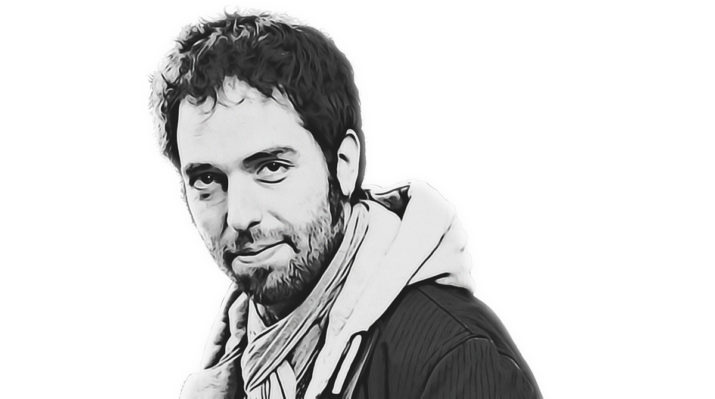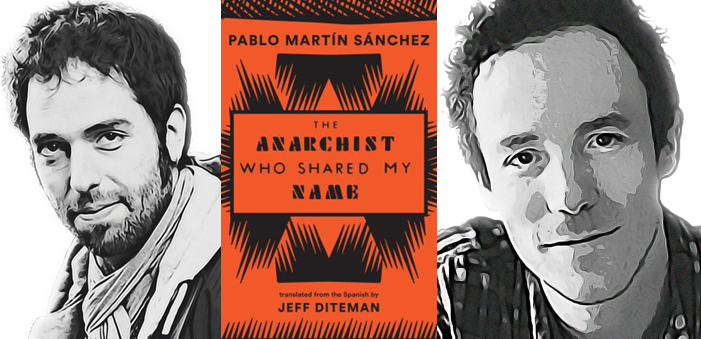

Translated from the Spanish by Jeff Diteman.
“Excellent work,” says the raspy-voiced, pock-faced man, as he holds out a copy of Spain: One Year of Dictatorship, “really excellent. In one week we’ve inundated Paris with pamphlets. It’s been a total success, and not just in the Spanish enclaves — the French are starting to come around, too. Between the meetings and this, it’s all bright red. I just heard that Blasco Ibañez already has a French translator for his leaflet, and JuanDura, his Spanish editor, can’t wait to put it out. It seems Vicentito is really serious about it, and they’re gonna translate it into English too, and distribute it in America. A million copies in all, they’re saying, sponsored by the Russian communists, who want to export their revolution to all of Europe. Some say they sent fifty thousand francs to defray the printing and distribution costs, but Blasco won’t confirm or deny it. Want some snuff?”
“No,” Pablo shoots back, a bit ill at ease in this improvised meeting in a reserved room at the Café de la Rotonde.
Of course, the man who won’t stop talking is Teixidó, the Committee’s director of propaganda, the same one who approached Pablo a couple of weeks ago after Blasco Ibañez’s speech. At his side is Vivancos, tasked with obtaining arms for the planned revolution. And next to him, Robinsón, with an angelic smile that Pablo doesn’t find at all reassuring.
“Durruti and Massoni will be here soon, I think,” says Teixidó as he lifts a pinch of snuff to his nose and inhales deeply. “Let’s wait five minutes, and if they’re still not here, we’ll tell you ourselves. In any case, I’m glad you’ve decided to work with the Committee.”
“Look, I was just doing my job. The guy to thank is old Faure.”
“No, I’m not talking about the pamphlet. I’m talking about the broadsides we want to print to send to Spain. It’s a good thing we can count on your help, because don’t think it’s been easy …”
“What? No, no. I haven’t promised anything about the broadsides.”
“No? But Robinsón told us …”
Six eyes now turn in unison to a man hiding under a bowler hat.
“Hey, we’ve got to talk if we’re gonna understand each other, right?” the vegetarian begins in his own defense, under the threat of being devoured by three carnivorous gazes. But before anyone can answer him, the door opens and Durruti enters, hastily removing his usual blue mechanic’s cap, followed by Massoni, looking like an out-of-place banker. The murmur of Don Miguel’s salon is audible from upstairs.
Today is Saturday, the eighteenth of October, 1924, and the fine, stubborn rain keeps falling on Paris, soaking into clothing and dampening hearts. Pablo has already been to Marly and back. And tonight, he has let Robinsón convince him to come to La Rotonde, the café par excellence of rebellions and conspiracies, located at the corner of the boulevards Raspail and Montparnasse. It was here that Lenin started incubating his own crusade, while playing chess with his nihilist compatriots; here that, between tirades, Trotsky slurped coffee as thick as the silt of the Seine. The café was also frequented by writers: Rubén Darío would come here to empty bottles of cognac and then to slog, hung over, through the writing of his journal Mundial; Pío Baroja would often show up in sandals and a scarf, lamenting that Paris was much more boring than his Bidasoa river valley; even Josep Pla, looking like an angry peasant, would come and sit in a corner to rant against anything that moved. But La Rotonde didn’t just thrive on hack writers and revolutionaries: for many years, it was also a melting pot of artists, bohemians, students, transvestites, police informants, petty criminals and an unending stream of people who spent hours conversing, drinking absinthe or contemplating the paintings that cluttered the walls. The models for these paintings would pop by every now and again and surprise the clientele, baring their garters and putting on lipstick in public.
La Rotonde was also, inevitably, the place chosen by many of the Spaniards living in exile to combine their forces and their words of resistance against the dictatorship of Primo de Rivera. Shortly before the coup d’état, the freemason Carlos Esplá, personal secretary of Blasco Ibáñez, founded an interesting discussion group here, called the “Spanish Club.” This club went on to become notorious, not so much for the quantity and quality of its participants, but rather for the amount of noise they were able to produce despite their small numbers. The café could be full of shouting people, and only the Spanish would be heard. With the ascent to power of the Military Directory, the group started to fill up with VIP expatriates, such as Marcelino Domingo, Francesc Macià or the former minister Santiago Alba, but the ones who really brought glamor to the group were not the politicians, but the writers and intellectuals, such as Ortega y Gasset and, most notably, Miguel de Unamuno, who became the undisputed star of the meetings, to the point that the “Spanish Club” was renamed “Don Miguel’s Club.” Indeed, the very epicenter of the exiled professor’s Parisian life was here at La Rotonde, where he came every day to compose the sonnets of his book De Fuerteventura a París, one of which ended up being inspired by the young man who, just now, in a private room in the same café, is standing up to shake hands with Buenaventura Durruti and Pedro Massoni:
“Good evening, comrades,” says Durruti, extending his thin hand to Pablo, and squeezing firmly, “Nice to meet you.”
“Hi,” Pablo replies, squeezing back.
Massoni sits down without saying anything and starts to leaf through some papers. Out of superstition or maybe just caution, Durruti remains standing, since the only free chair has its back to the door.
“Have they told you what’s going on?” he asks.
“Well…” Teixidò starts to excuse himself, rubbing his nose, “the thing is … Look. It seems there’s been a misunderstanding.”
“What’s the problem?” Massoni asks, lifting his eyes from his papers. With a frank look, he says to Vivancos, “If it’s a question of money, we don’t have a red cent.”
“The problem is that he doesn’t want to collaborate,” says Teixidò.
“Wait, look,” Pablo defends himself, “it’s not that I don’t want to help, but it’s not as simple as that. I already told Robinsón — ” and here, he shoots Robinsón a dirty look “ — that we can’t print the broadsides without Faure’s consent, and it seems that Faure flat refused.”
“Yeah, exactly,” Durruti huffs, “and that’s why we thought of you. Knowing your militant history, we thought that you wouldn’t mind giving us a hand, particularly in a moment like this, which is so difficult for us. We’ll provide the paper, you don’t have to worry about that, we already ordered ten thousand sheets …”
Everyone looks at Pablo, except for Robinsón, who is busy picking a bit of lint from his bowler, while in the next room, Unamuno receives applause after reading his latest sonnet.
It should be noted that Unamuno does not come to La Rotonde just to garner applause: from day one he realized that this place is an inexhaustible source of stories, and any time he can, he takes advantage of it to listen and snatch bits of conversation out of the air: secrets revealed, rumors and jokes recounted; the inimitable raw materials he turns into his articles in Le Quotidien, which light up the minds on the other side of the Pyrenees and make Henri Dumay wring his hands — Dumay being the director of the newspaper and the one who organized Unamuno’s rescue in Fuerteventura. The razor-sharp, vulgar wit of the ex-rector of Salamanca has grown so famous in Paris that a French journalist said that he uses ink to frustrate his enemies, like an octopus or squid. The crowning moment came in late summer, when Primo de Rivera himself wrote an angry letter to Dumay denying the accusations Unamuno had heaped on him. The letter was published immediately, on the front page, three columns wide, along with the implacable image of the ex-rector. Le Quotidien has been strictly banned in Spain since then.
The power that Unamuno has acquired in the salon is so great that he has allowed himself the indulgence of tacitly expelling Rodrigo Soriano, who was rescued along with him from Fuerteventura. The trigger was the publication, in Paris Soir, of an article by Soriano, in which he criticized “armchair revolutionaries,” in clear reference to Unamuno. Since then, the ex-rector never grows tired of repeating, while fidgeting with his bread and reminiscing about his time imprisoned in the Canaries, that “The dictator didn’t punish me by banishing me to Fuerteventura. The real punishment was making me live with Rodrigo Soriano — and that’s what I can’t forgive,” and then, gathering momentum from the laughter in the peanut gallery, he goes on: “I know Don Rodrigo is nothing but a mosquito, but the thing is that mosquitoes sometimes get into an animal’s ears and annoy them till they drive them crazy. But he doesn’t annoy me, the little mosquito.” One of the biggest fans of these speeches is Blasco Ibañez, Soriano’s well-known enemy, who, even though he has his own salon at the Café Américain, never misses a chance to pop by La Rotonde to take advantage of Don Miguel’s popular draw in order to spout a few of his own diatribes, usually followed by a bit of self-aggrandizement. Such as now, when he has just arrived at the salon with an elegant, slightly cross-eyed lady on his arm, while Pablo is meeting in the private room with the vanguard of the Committee of Anarchist Relations. The first person he sees is José María Carretero, the young, prolific Spanish writer who signs his works with the somewhat immodest pen name “El Caballero Audaz.”
“Come to my arms, Carretero!” exclaims Don Vicente, with his enormous rain-barrel gut. Carretero lets himself be embraced, to the point of
almost disappearing.
“How are you, Don Vicente?”
“Fine, fine, thanks. Have you read the Quotidien?” he asks, not bothering to introduce the woman on his arm.
“Yes, I’ve seen the interview. It seems you’re in revolutionary mode. Is that so?”
“Absolutely.”
“And what are you thinking of doing?”
“Why, what must be done: the revolution!”
“And how is that done, Don Vicente?” asks the Audacious Gentleman, with a certain disingenuousness, as if to belie his pen name.
“Don’t you play innocent with me, Carretero, open your eyes. Spain can’t go on like this, any way you look at it. And that’s just the problem: the people who should be doing something prefer to close their eyes and look the other way. What we need in Spain are more Strogoffs, you get me? People who are capable of weeping for their nation and saving the whole country’s sight, despite the hot irons that the bastards want to shove in their eyes. We have to wake people up, Carretero, get ‘em jumping. And I’m planning to do it, no matter what. I’ll hold the necessary meetings, I’ll write articles in the newspapers, I’ll distribute my pamphlet myself, if I have to …”
“And you haven’t thought about taking up arms?” the young writer interrupts.
Blasco pales a bit, and then bursts out in a great peal of laughter, which silences everyone around him. Then, becoming suddenly serious, he replies:
“Look, sir, you’re making a big mistake if you think I’m some kind of Captain Araña, who’s going to embark a crew and then stay on the land. No, no, my dear friend. No, I’ll be on the front lines, you hear me? I’ll be the first to take a bullet in the chest!” Raising his voice, he concludes emphatically: “I’ve lived enough, and I don’t care if I die. I’m not afraid of them! I’m not afraid to fight, and I’m not afraid of death!”
A flurry of applause accompanies his closing words. Carretero excuses himself and goes to dine upstairs with a more cautious group of Spaniards, having decided to write a biting little exposé to take Blasco down a notch, which he will end up titling, “The Novelist Who Sold His Country Out.” But let’s leave Blasco, the Caballero Audaz and their dialectical battles for now. Let’s go down these two flights of stairs, which lead, at the bottom and to the left, to the private room, where we’ve just heard the conversation between Pablo and Durruti and company. Because let’s not forget that La Rotonde is not just a haven for politicians and intellectuals who fight their revolution using letters to the editor and rhetorical devices, but also for true men of action, erudite anarchists who cherish more than anything the elegant lines of a Browning semiautomatic, the impossible beauty of a harmonica pistol, or the understated grace of a cachorrillo, the pocket pistol Larra used to commit suicide. So, while Unamuno and his ilk wage their paper war, the next table is usually talking about incursions, attacks, offensives and putsches. But when things get serious, or there’s concern that a snitch or informant is in their midst, they go downstairs to meet in the private room at the bottom left.
“Fine, okay, I’ll do it,” Pablo finally gives in, although he’s still not very sure that a revolutionary incursion is the best available option. “When do you need it?”
“The date of the expedition hasn’t been finalized yet, it doesn’t depend so much on us but on the comrades in the interior, but the broadsides can be printed now. Well, as soon as we get the paper, of course.”
“And the money,” Massoni interjects, “Since, between Vivancos and Teixidó, we’ve spent everything.”
The accused try to protest, but Durruti nips the conversation in the bud:
“Please, friends, we’ve come here to make plans. Let’s leave the dirty laundry for some other time. Pablo, thank you for your cooperation, doubtless you will be a great help. I don’t need to tell you that this matter calls for the utmost discretion. We will keep in touch with you through Robinsón, if you like.”
And so, after shaking hands with everyone present and casting a dire look at Robinsón, Pablo makes his exit from La Rotonde. Meanwhile, in Don Miguel’s salon, someone’s just told a joke and the room erupts in strenuous laughter.
Safe to say, Pablo has now been inducted into the Orchestra of the Revolution.
Pablo Martín Sánchez was born in Reus, Spain in 1977. He graduated from the Institut del Teatre de Barcelona with a degree in Dramatic Art and from the University of Barcelona with a degree in Literary Theory and Comparative Literature. He received a Master’s degree in Humanities from the Carlos III University of Madrid and a Ph.D. in French Language and Literature from the University of Lille-3 as well as a a Ph.D. in Literary Theory and Art and Comparative Literature from the University of Granada. He is the author a collection of short stories, Fricciones (E.D.A. Libros, 2011), and two novels, The Anarchist Who Shared My Name (El anarquista que se llamaba como yo) and Tuyo es el mañana (Acantilado, 2016). In addition, he has translated the works of authors such as Alfred Jarry, Raymond Queneau, and Wajdi Mouawad, and teaches writing at the Ateneu School of Writing of Barcelona. In 2014 he was invited to join the Oulipo and is currently the only Spanish member of the group.
Jeff Diteman is a writer, artist, and translator from the French, Spanish, and Italian. He is currently studying for his Ph.D. Comparative Literature at the University of Massachusetts in Amherst. His writings and translations have been featured in Drunken Boat, The Missing Slate, Nailed Magazine, and Inventory.
This excerpt from The Anarchist Who Shared My Name is published by permission of Deep Vellum Publishing. Copyright © 2012 by Pablo Martín Sánchez. Copyright © 2012 by Quaderns Crema, S.A.U. (Acantilado, Barcelona). English translation copyright © 2018 by Jeff Diteman
Published on October 2, 2018.




